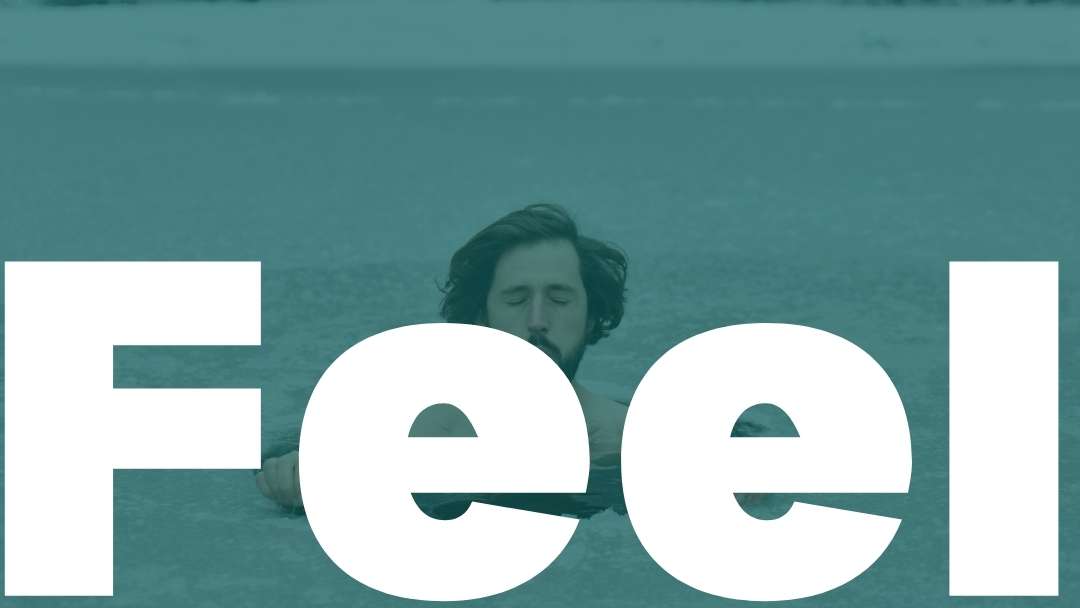Episode 437
Lean Into Discomfort

When we feel the cold, we might try to escape it by thinking hot thoughts, imagining the sun in our faces or a warm blanket. Normally that leads us to disconnect more from the cold, and therefore leads us to more discomfort.
If instead we embrace the cold, we might notice that the thing we are running from is not so bad after all. The cold might not be our favorite state, but it is a sensation more or less like any other.
It is the same with our emotions. We do whatever we can to avoid feeling them. When we finally do, we find that they are not what we imagined; they are just another element of us.
Hosts & Guests
Kurt Robinson
Transcript
Welcome beautiful thinkers, I’d like to talk to you about leaning into discomfort.
So so many times, we think we know what is good for us. And we think that running away from the discomfort is going to help. And many times what we actually need to do is look forward a little bit more, come towards it a little bit more.
And these things I noticed, for example, when it’s particularly cold, so, right now, this is I think, probably the longest winter I’ve ever seen in Guadalajara, it’s not that long, actually, it’s a couple of months.
And you know, the days it’s still like 24 degrees Celsius, and it’s warm if you’re in the sun, so it’s not that much of a problem.
However, getting up in the morning, like this morning, I got up at 530 and took a nice cold shower.
Well, it’s a little bit difficult.
Sometimes it is, sometimes it isn’t.
And I say to myself, before I get in the shower, I’m like, “Alright, what is going to come? It’s just information.” And I try to embrace the cold and, sooner or later, get to the point in a cold shower, when we start to think, “Oh, I wish it were colder. I wish there were more cold as than to crave it.”
And I think this happens for a lot of people who take cold showers.
There was a video that popped up the other day. I think it was Andrew Huberman Huberman labs. And he was saying how cold showers scientifically, there are studies about it. He said “they’re better than sex better than cocaine.”
So in terms of the dopamine response, cocaine and sex are likely to produce this spike in dopamine, that’s about two times your ordinary levels.
A cold shower is going to produce a spike that’s about 2.5 times your ordinary levels.
And it’s also going to last about three hours.
Where’s the high from cocaine probably last about 30 minutes.
From sex? Maybe? Well, I guess it depends how much of a stallion you are. But I don’t think is likely to last three hours, while maybe you’re going to go out and brag to your friends about and accuse you out of remorse.
Anyway, the point is that cold shower tends to produce more positive valence than cocaine or sex. It’s pretty interesting. And this is a thing that people really run away from.
I try to tell people about cold showers like, “Oh, no, I could never do that.” Like, really?
“Look into your heart, look into your lineage of your ancestors. Think about the things that they did facing those Tigers facing cold nights in the caves, having to hunt and forage for that food.”
All of those depressions that they went through, all of those hard times on the farm.
And here we are, and we say, “I’m not going to take a cold shower!”
“Why? Look at what you have to gain! All of these health benefits!”
Likewise when we’re outside and it gets cold, chilly in the night, and we breathe in shallowly.
And we experience a lot of resistance and we keep breathing shallowly because we somehow think, “Oh well this is how I’m going to conserve my warmth.”
Now, I try to explain to people sometimes: what you want to do when you get cold is not try to be warm. If you try to be warm, or you’re trying to psych yourself up, or you’re trying to imagine a nice sunny day, that is not going to help you, not in the way you think it is.
Because it’s only going to last for a couple of seconds.
Even if you have this strong power of visualization, imagining that beaming hot sun, on a nice warm beach, in a minima. It’s only going to last a few seconds. But if you get into the cold, you will start to experience the cold in a different way.
And that’s why we do things like the Wim Hof Method, you breathe in, like hyperventilate with that cold air.
Or you just take a big old breath of that cold air and let it fill you.
Or as they say, as the Russian father says on The OA, he says, “What is the only way? I’m gonna try to do a Russian accent What is the only way? No, I’m not gonna do it. What is the only way to defeat the cold and always says, “To be colder than it is.”
And that’s what we have to do.
Likewise, with our emotions, we feel our feelings, have so many things going on within our bodies, some kind of complex of frustration, anger, sadness, delight, hidden somewhere amongst it.
And what do we do with them, trying to push them down, or talk around them, even though we really know it quite uncomfortable.
Like I said the other day and a video, we’re introverted.
Our tendency is to go silent.
We don’t talk about our feelings.
We’re extroverted.
Our tendency is to talk about anything but feelings.
So burden forms have ways of avoiding these subjects.
But we find ways ways to avoid them. All kinds of ways, all kinds of complex ways to avoid feeling what we’re feeling.
So go to it.
Lean into that discomfort.
What is going on inside me and someone asked you so many times?
What are the emotional sensations? And what are the physical sensations?
Is there a tightening of the abdomen? Tightening of the intestine? Tightening of the chest?
Are we experiencing tachycardia? That is increased heart rate?
Is there some discomfort in the cranium, in the head, some kind of tightness, or some kind of eakiness in the head ,in the forehead, the back of the neck? Is there a headache? What is going on?
Feel these feelings, physiological, physical feelings and the emotional feelings, all of it.
Where we lean into this discomfort ,when we find a way to experience it directly, not running away from it. This might be the thing that scares us the most. This might be the thing that heals us the most.
When we lean into discomfort.

New Episodes Every Weekday
11am Mexico City time
10 min episodes Monday - Thursday
1 h interview episode on Fridays
As an Amazon Associate I earn from qualifying purchases.
Stay Beautiful &
Stay Connected
